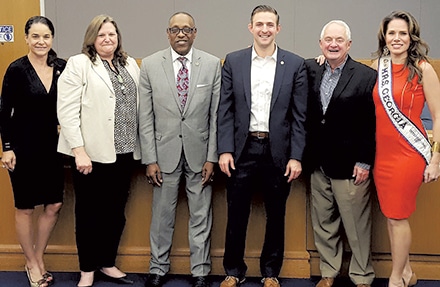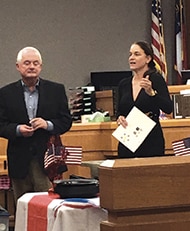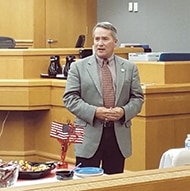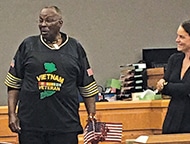
Judge Carla Brown stands in the middle of her courtroom this Thursday afternoon. She’s smiling and calling defendants by name, asking about their health, their families, and their general well-being.
Interestingly, the defendants are smiling back at the judge, catching her up on their goings-on over the past month, and even cracking jokes now and then. In courtroom 2D in the Gwinnett Justice and Administration Center, there’s something happening. And it’s working.

The November 9 session was a special one, as nine veterans graduated from the intervention program. Some had issues with drugs and/or alcohol. Others were battling domestic violence. Some were attempting to settle housing matters. Still, others had been nearly crippled by Post Traumatic Stress Disorder (PTSD) and the host of problems that spin off of that malady. What they all had in common was that they were veterans, and their legal issues were rooted in the painful aftermath of war. But instead of cycling these people in and out of the justice system time and again, Judge Brown and some colleagues had a better idea. Why not help these people who have served (or who are still serving) this country, by assisting them to address the obstacles that are hindering successful reentry into civilian society?
“I am passionate about serving our veterans. My dad was a vet,” Brown said, adding that she wore a POW/MIA bracelet for 15 years until the remains of a Vietnam vet and family friend were finally found. “We were never taught about the Vietnam War in school, so I did my research. Sadly, all vets returning home are ignored; Vietnam vets were treated very badly.”
The idea for an intervention/accountability court was a good one, a necessary one, and with this first graduating class, it’s proven to be a successful one. To celebrate both Veterans Day and the nine graduates of the program, several local and state VIPs were on hand Thursday to applaud the hard work of both the graduating vets as well as those still in the program. Congressman Jody Hice and Mrs. Georgia, Melanie Caceres, were just two of the respected public figures who paid their respects at last month’s ceremony.

Gwinnett County Commission Chairwoman Charlotte Nash is another dignitary who made it a point to celebrate with Judge Brown and the veterans. “We’re lucky to have an innovative judicial program here. I want to thank each of you for your service,” Nash said, adding a very personal remark directed to the Vietnam veterans in the room. “Vietnam was the war of my generation, and I want to sincerely apologize for this country’s treatment of you when you returned home from war. It was an embarrassment and a disgrace.”
Melanie Caceres, uniquely qualified to understand veterans’ struggles, also offered some poignant remarks. Not just a pretty face as Mrs. Georgia, Caceres is an Air Force veteran, having served honorably for 12 years. “We all enlisted for our own personal reasons. I was deeply impacted by 9-11. I heard and saw what happened, and the next morning, I went down to the local recruiter’s office to enlist. I sat on the curb for two hours before the office opened. I could have waited at home, but I knew that if I did, my mom would try to talk me out of it,” Caceres said. She was right; after she enlisted, she went home and told her mother what she had done. “She said, ‘well let’s just go down there and tell them you changed your mind!’”
Caceres smiled as she shared that story, but she took on a serious tone when she told how difficult it was for her to assimilate back into civilian life and culture. “I almost reenlisted. That’s how hard it was. The transition was difficult for me.” She added that networking is what makes VIP court work. No one person has all the answers or knows of all the resources available to veterans, but a group of people who network with one another is very effective. Ron Goodbub, an active “behind-the-scenes” player in the local and state political world (and a good friend of Judge Brown’s), is a veteran himself. When he heard about VIP court, he began showing up for the monthly sessions. He began telling people about the program, and before long, many people with various connections offered their help. Currently, other judges, defense attorneys, probation officers, even Szabo roll up their sleeves and provide their help to veterans participating in the program.
“I’m both an army wife and an army mom,” Szabo told the veterans. “So when I say I’m going to do whatever I can to help you, know that I mean it. It matters to me.”
Other public figures were on hand at last month’s graduation session. Gwinnett County Commissioner Jace Brooks, County Administrator Glenn Stephens, State Court Judge Emily Brantley and State House Representative David Clark each stood – not to be honored, but to pay their respects to the veterans in the room. Congressman Rob Woodall, while in Washington for the graduation celebration, sent written words of encouragement to the group.
Each graduate received a copy of the constitution, as well as some tokens of gratitude and accomplishment from Judge Brown.
Daniel, one of the graduating veterans, said, “It was great to go through this with others who were here for similar reasons. It’s nice to know you’re not alone.”

And Nick, a young three-tour veteran who still serves in the National Guard, courageously shared his story. “2015 was a bad year for me. Three of my friends committed suicide, and my girlfriend broke up with me.” Soon after, he lost yet another friend in a tragic motorcycle accident. “I needed help, but I didn’t know how to get it, so I began treating my problems with alcohol. In February 2016, I found myself in Gwinnett County. I don’t know why I was here, but I guess I had blacked out while driving, and I got a DUI. That’s how I met Judge Brown and was able to get into this program. In civilian court, I know they would have thrown the book at me, but here, we get help along with the sentence the judge hands down.” Nick was quick to say that Judge Brown is no pushover, but she is also fair. “She’ll tell you real quick if she thinks you’re lying or making excuses, and I’ve seen her send people to jail. But you can tell she’d rather help people in here rather than just send them off to jail.”
Today, Nick is happy to say that he’s getting his life together, and he’s even met a young woman. He added that last with a smile.
A program such as Gwinnett County’s VIP court is always changing, and can ever use help from the public. On the horizon is a website that includes all Gwinnett accountability courts and their 501(c)3 status. At that time, donors can help veterans in the program with monetary donations. Currently, according to Brown, mentors are desperately needed in the VIP Court program. “We could use veterans who are willing to mentor. If they have experience dealing with the VA, even better.”
For more information about veterans’ court, visit the Gwinnett County website at www.gwinnettcounty.com, and search “Veterans Intervention Program.”

